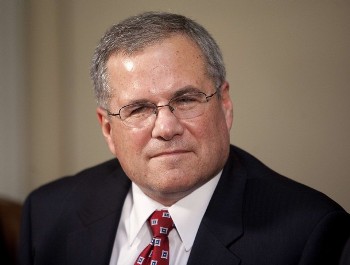US special envoy met with proposed lobbyist for Sudan
October 11, 2009 (WASHINGTON) — The US special envoy to Sudan Scott Gration met with a lobbyist who is quietly pushing behind the scenes to represent Sudan, according to a newspaper report.

The report does not definitely indicate whether Gration supports the lobbyist’s intention to represent Sudan, but his office did make a failed attempt to win the approval of Sudan’s ambassador in Washington, according to one Sudanese official.
Crowe has met Gration to discuss the idea along with other US lawmakers to gather support for the idea. The US special envoy initially rejected the idea but later urged Crowe to seek congressional support.
The same newspaper has previously reported that Gration met with Robert McFarlane, the former National Security Advisor to President Ronald Reagan who is trying to informally lobby for Sudan in Washington.
There is a great deal of confusion on the path Washington is taking in dealing with Khartoum. Gration has been outspoken on the need to ease sanctions on Sudan and removing the African country from the states sponsor of terrorism.
The remarks made by Gration to the Washington Post in late September drew fierce criticism from Sudan advocacy groups.
“We’ve got to think about giving out cookies,” said Gration. “Kids, countries — they react to gold stars, smiley faces, handshakes, agreements, talk, engagement,” Gration said in an interview.
The White House hastily rushed to distance itself from the policy set forth by Gration in the story.
“This article wildly misrepresents the policy discussions that have occurred in the White House, with quotes that have been cobbled together out of context,” White House spokesman Tommy Vietor told US ABC network.
But deep divisions within the US administration are blocking the release of Sudan’s comprehensive policy review.
The Washington Post said that some State Department and White House officials are particularly uncomfortable with Gration’s conciliatory approach to Sudanese President Omar Hassan al-Bashir, who has been indicted on charges of war crimes and crimes against humanity by the International Criminal Court in The Hague.
The newspaper revealed that the negotiations over the lobbying proposal started this year between aides to Kerry, who led a congressional delegation to Khartoum in April, and Bob Arnot, a physician and television personality active in humanitarian causes.
Arnot then approached Crowe with the idea, leading to an application this summer with the Treasury Department’s Office of Foreign Assets Control (OFAC), which must approve any U.S. firm doing business with Sudan.
A State Department official, who spoke on the condition of anonymity, said OFAC rejected the initial application on Gration’s recommendation. That led to further talks between Crowe, Gration and other administration officials.
“It was our understanding that Nelson Mullins was going to work on getting support from key members of Congress about the work they wanted to pursue in Sudan,” the official said.
The Washington Post quoted an unidentified senior official in Sudan’s national unity government as saying that Gration’s office repeatedly urged the country’s ambassador in Washington to sign off on the proposed contract beginning in June, before a Washington summit of Sudanese leaders.
But the ambassador, Akec Khoc, a figure in South Sudan ex-rebel group, declined to endorse the deal because he and others were not familiar with it, the official said.
Crowe said in an interview that he did not seek to work for Sudan but was convinced by Arnot and Kerry’s office that a deal could be arranged that would move the country toward peace. He said the proposed agreement would require Sudan to take tangible steps for the relationship to continue, including allowing the return of humanitarian organizations to Darfur; allowing free and fair elections; and increasing cooperation with the United States on terrorism and other issues.
“We’ve been very, very careful in terms of our discussions with Sudan in terms of being able to help them,” Crowe said. “We’ve been very specific on guidelines that they would have to meet.”
Crowe declined to say how much the Sudanese regime would pay Nelson Mullins for its services. The last lobbyist to represent Sudan, Robert J. Cabelly of C/R International, had a $530,000 annual contract with the regime that ended in early 2006 amid an outcry in Congress.
(ST)

oshay
US special envoy supporting Sudan lobby proposal
I hope Sudan Tribune is not criticizing the fact that there will be a lobbyist in Washington for the betterment of Sudan…….
Time1
US special envoy supporting Sudan lobby proposal
Mr Gration
you are a well respect person, stay away from that “wheeler-dealer”, he will cost you your job and reputation while he is just going to continue with this business as usual.